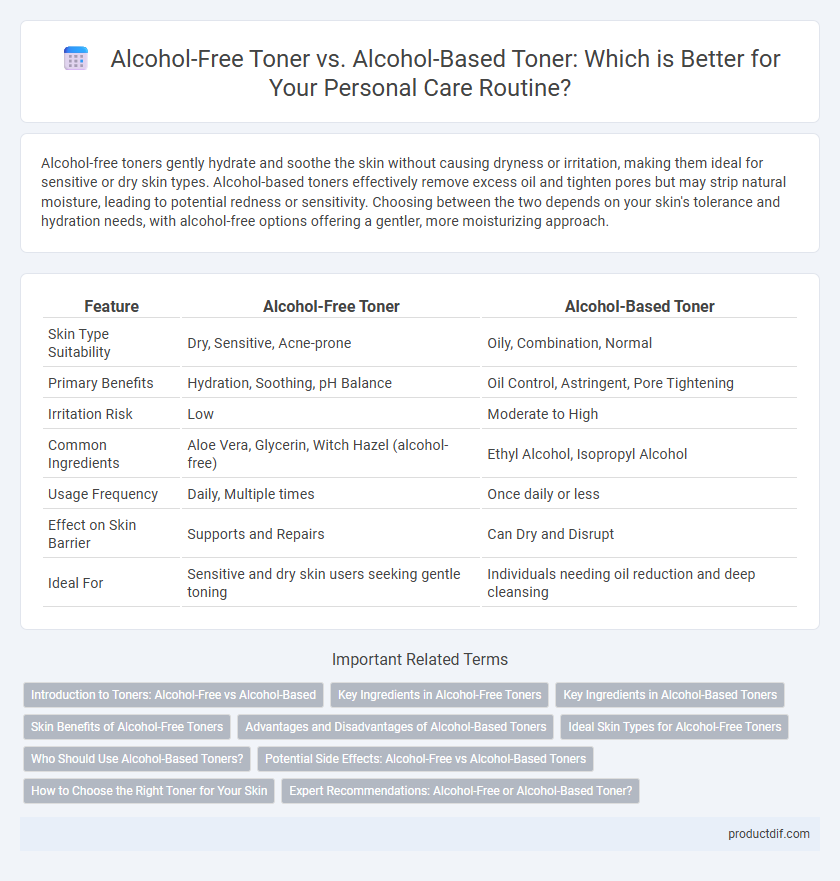Alcohol-free toners gently hydrate and soothe the skin without causing dryness or irritation, making them ideal for sensitive or dry skin types. Alcohol-based toners effectively remove excess oil and tighten pores but may strip natural moisture, leading to potential redness or sensitivity. Choosing between the two depends on your skin's tolerance and hydration needs, with alcohol-free options offering a gentler, more moisturizing approach.
Table of Comparison
| Feature | Alcohol-Free Toner | Alcohol-Based Toner |
|---|---|---|
| Skin Type Suitability | Dry, Sensitive, Acne-prone | Oily, Combination, Normal |
| Primary Benefits | Hydration, Soothing, pH Balance | Oil Control, Astringent, Pore Tightening |
| Irritation Risk | Low | Moderate to High |
| Common Ingredients | Aloe Vera, Glycerin, Witch Hazel (alcohol-free) | Ethyl Alcohol, Isopropyl Alcohol |
| Usage Frequency | Daily, Multiple times | Once daily or less |
| Effect on Skin Barrier | Supports and Repairs | Can Dry and Disrupt |
| Ideal For | Sensitive and dry skin users seeking gentle toning | Individuals needing oil reduction and deep cleansing |
Introduction to Toners: Alcohol-Free vs Alcohol-Based
Alcohol-free toners cater to sensitive and dry skin types by providing hydration and soothing benefits without the risk of irritation or dryness commonly associated with alcohol-based toners. Alcohol-based toners contain ingredients like ethanol or isopropyl alcohol, which help to remove excess oil and tighten pores but may cause sensitivity or redness in certain skin types. Choosing between these toner types depends on individual skin concerns, with alcohol-free options favored for gentle cleansing and alcohol-based toners preferred for oil control and acne-prone skin.
Key Ingredients in Alcohol-Free Toners
Alcohol-free toners typically contain soothing ingredients such as aloe vera, chamomile extract, and hyaluronic acid, designed to hydrate and calm the skin without irritation. These key components help maintain the skin's natural moisture barrier and prevent dryness often associated with alcohol-based toners. Formulated for sensitive or dry skin, alcohol-free toners avoid harsh solvents like ethanol or isopropyl alcohol that can cause redness and flakiness.
Key Ingredients in Alcohol-Based Toners
Alcohol-based toners typically contain ingredients such as denatured alcohol or ethanol, which act as astringents to remove excess oil and tighten pores. These toners often include botanical extracts like witch hazel and salicylic acid, enhancing exfoliation and acne control benefits. While effective for oily skin types, their alcohol content can cause dryness or irritation for sensitive skin.
Skin Benefits of Alcohol-Free Toners
Alcohol-free toners provide gentle hydration and help maintain the skin's natural moisture balance without causing dryness or irritation. They are ideal for sensitive or dry skin as they soothe redness and reduce inflammation while refining pores. Unlike alcohol-based toners that can strip essential oils, alcohol-free formulas support a healthy skin barrier and promote long-lasting softness and smoothness.
Advantages and Disadvantages of Alcohol-Based Toners
Alcohol-based toners offer strong antiseptic properties, effectively reducing acne and controlling oil production, but they can cause skin dryness, irritation, and sensitivity, especially for sensitive or dry skin types. Their rapid evaporation leaves a refreshing feel but may disrupt the skin's natural moisture barrier, leading to long-term dehydration. Users with oily or acne-prone skin may benefit from their clarifying effects, whereas those with delicate skin should opt for alcohol-free alternatives to maintain hydration and reduce irritation.
Ideal Skin Types for Alcohol-Free Toners
Alcohol-free toners are ideal for sensitive, dry, and combination skin types as they hydrate and soothe without causing irritation or excessive dryness. These toners often contain calming ingredients like aloe vera, chamomile, and glycerin, which help maintain the skin's natural moisture barrier. In contrast, alcohol-based toners may be more suitable for oily and acne-prone skin due to their astringent properties but can strip moisture from more delicate skin types.
Who Should Use Alcohol-Based Toners?
Alcohol-based toners are ideal for individuals with oily or acne-prone skin, as they effectively remove excess sebum and prevent breakouts. These toners often contain antiseptic properties that help reduce bacteria and tighten pores, promoting clearer skin. People with sensitive or dry skin should avoid alcohol-based formulas to prevent irritation and dryness.
Potential Side Effects: Alcohol-Free vs Alcohol-Based Toners
Alcohol-based toners can cause dryness, irritation, and redness, especially for sensitive or dry skin types, due to their high concentration of ethanol or isopropyl alcohol. Alcohol-free toners often include soothing ingredients like aloe vera, glycerin, or chamomile, which help maintain skin hydration and reduce the risk of inflammation. Choosing alcohol-free toners minimizes potential side effects such as flakiness, tightness, and disrupted skin barrier function commonly associated with alcohol-based formulas.
How to Choose the Right Toner for Your Skin
Choosing the right toner for your skin depends on your skin type and sensitivity; alcohol-free toners are ideal for dry, sensitive, or acne-prone skin as they hydrate and soothe without causing irritation. Alcohol-based toners are better suited for oily or combination skin types because they help remove excess oil and tighten pores. Consider your skin's needs, such as hydration or oil control, to select a toner that balances pH and maintains skin health effectively.
Expert Recommendations: Alcohol-Free or Alcohol-Based Toner?
Dermatologists often recommend alcohol-free toners for sensitive and dry skin types due to their hydrating and soothing properties, minimizing irritation and redness. Alcohol-based toners, containing ethanol or isopropyl alcohol, are typically suggested for oily or acne-prone skin to effectively remove excess oil and tighten pores. Expert advice emphasizes choosing a toner based on individual skin concerns, preferring alcohol-free formulations for maintaining skin barrier health in most cases.
Alcohol-free toner vs Alcohol-based toner Infographic

 productdif.com
productdif.com